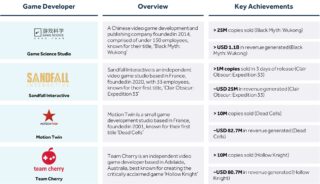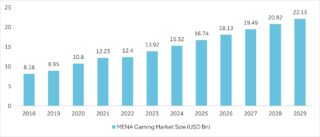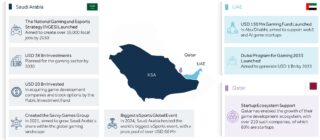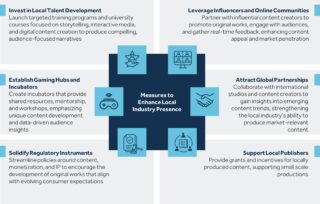
Introduction
From the days of arcade machines to the rise of home consoles, one constant within the gaming industry is change. Today that change is taking a new form, as gamers increasingly turn away from legacy franchises built on recognition and move towards original titles that offer creative narratives.
This shift opens a window for emerging regions within the industry, particularly the Middle East. As the global market is on the lookout for new and unique experiences, the region has the potential to capitalize on this and provide consumers with well-polished games with captivating narratives that capture the interest of players.
From Hype to Discernment: The New Consumer Preference
In recent years, the global gaming audience has undergone a significant shift in expectations, moving away from brand loyalty, and gravitating toward gameplay depth, storytelling, and transparency. Players are now more informed, selective, and quality driven, reshaping how success is defined in the industry. An analysis into recent developments within the industry outlines the following key shifts in consumers’ approach to gaming:
“Wait-and-See” Culture Replacing Pre-Orders
The decline of pre-orders reflects growing skepticism toward marketing-first releases, as players increasingly wait for launch day performance and real user feedback before buying. Games such as Cyberpunk 2077 and Concord, marketed as major releases from their respective studios, saw sluggish sales after negative early impressions spread online demonstrating that gamers now prioritize trusted reviews over trailers or brand names.
Community Platforms Emerge as the Primary Channel for Advertisement
Platforms like Twitch, TikTok, and Reddit have emerged as primary channels for game discovery, often replacing traditional advertising. For example, Lethal Company surged in popularity in late 2023 not through a press tour, but via viral traction on TikTok, driving community engagement and generating USD 145 Mn in revenue, demonstrating how virality now plays a more decisive role in growing player bases.
Quality and Value Over Franchises
Gamers are increasingly drawn to original narratives over formulaic sequels, especially when backed by strong writing and immersive world-building. Expedition 33, a turn-based RPG released in 2025 with distinctive art direction and unique storytelling was well received globally for its creative premise. In contrast, legacy IPs such as Call of Duty: Modern Warfare 3 faced criticism for predictable design and uninspired storytelling, highlighting a growing demand for originality executed with purpose rather than nostalgia delivered without quality.
Faltering Giants: Why AAA Studios Are Losing Ground
The traditional dominance of AAA publishers has been shaken by misfires, inflated budgets, and eroding consumer trust. Gamers are increasingly critical of unfinished releases, exploitative monetization, and corporate opacity. While these companies still command enormous resources, their grip on the market has weakened due to repeated misjudgements and a failure to evolve alongside changing audience expectation.
Repeated High-Profile Failures Have Shaken Player Trust
AAA publishers are struggling to recover from a string of underwhelming releases that failed to justify their budgets or reputation. Redfall, launched in 2023 as a flagship Xbox title, was widely criticized for its broken AI, lack of polish, and technical instability, leading to low sales and the eventual shutdown of its studio. Similarly, Forespoken faced backlash due to its weak storytelling and gameplay, which led to its underperformance despite Square Enix’s heavy investment, indicating that gamers are no longer giving big studios the benefit of the doubt.
Ballooning Budgets Without Appropriate Returns
Many AAA titles now cost hundreds of millions to produce, making them financially unsustainable unless they become runaway hits. The Callisto Protocol, for example, reportedly needed to sell five million copies to break-even but barely reached half of that target, despite heavy promotion. Studios are increasingly burdened by these high-risk models, where even a decent performance can be deemed a failure if it does not meet inflated sales projections.
Layoffs and Studio Closures Indicates Instability
Rather than course-correct creatively, many major publishers have responded to underperformance with mass layoffs and studio closures. Microsoft’s 2024 closure of Arkane Austin and Tango Gameworks, both of which had recent releases highlights how even major studios are expendable when margins are missed. This signals to both players and developers that creative risks are discouraged, further distancing AAA companies from the evolving player mindset.
Rise of Small Studios – Market Share Shifts
While AAA studios struggle with managing their complex pipelines, small studios are seizing the moment. Backed by leaner operational models and a willingness to take creative risks, these studios are gaining traction and commercial success on the global stage.
Social media virality has emerged as a powerful catalyst for smaller game studios, enabling them to reach global audiences without the extensive marketing budgets of AAA developers. Platforms such as TikTok, Reddit, and YouTube has allowed independent titles to gain traction rapidly. This grassroots exposure has not only driven game sales but also fostered strong community engagement, turning lesser-known titles into mainstream successes through organic, community driven momentum. A few of the most prominent studios that have emerged as a result are as follows:

The Growth of Gaming in the MENA Region
The MENA region has significant growth in the gaming industry, with the overall market size estimated to reach USD 22.15 Bn by 2029, driven by increased internet penetration, rising disposable incomes, government investments in digital infrastructure, and a rapidly growing youth demographics.
 The MENA region has seen consistent growth within the past years, and is projected for further growth
The MENA region has seen consistent growth within the past years, and is projected for further growth

As the global gaming industry evolves, the Middle East is uniquely positioned to step in not just as a consumer market, but as a key player in development, publishing, and innovation.
The Opportunity: Building the Middle East’s Gaming Identity
The region has already taken promising steps, with countries such as Saudi Arabia and the UAE leading in gaming industry investments, supported by government programs, strategic frameworks, and dedicated funding for infrastructure and talent development.

While initiatives have taken root, gaining further momentum is crucial to truly capitalize on the global industry shift. To move from emerging player to global contributor, the region must take targeted steps that support creators, build ecosystems, and amplify its unique voice in gaming, a few of which are outlined as follows:

Conclusion
The shift in global gaming trends has made one thing clear: the old rules no longer guarantee success. Players are no longer swayed by brand names or marketing; they are choosing games that offer real value, creativity, and connection. As AAA studios lose ground and smaller developers rise, the door has opened for new regions to lead. The Middle East has both the tools and momentum to step into that role. What happens next will depend on how boldly the region backs its creators, builds strong game ecosystems, and align with players’ shifting preferences. The Middle East is at the crossroads, with the chance to not just participate in the global gaming market but to redefine it through bold investments, compelling narratives, and a distinct creative voice.
References:
- BBC (2025)
- PwC (2025)
- Saudi Arabia Public Investment Fund (2025)
- Bloomberg (2024)
- IGN (2024)
- Statista (2024)
- Zawya (2024)
- Gamalytic (2024)
- Polygon (2024)
- Global Times (2024)
- InvestQatar (2023)
- Dubai Future Foundation (2023)
- Forbes (2023)
- GamesRadar (2023)
- Scrippnews (2023)
- OECD (2022)
Related articles

From Long Lessons to Microlearning: Rethinking How We Learn

AI for AI: Artificial Intelligence for Accessibility and Inclusion in Education


